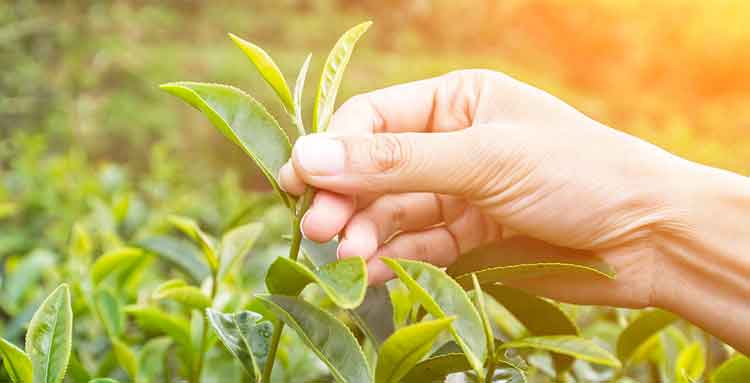January, 30, 2025

The members of Tea Exporters Association (TEA) are concerned over the proposed abolition of SVAT from April 2025 as cashless SVAT system (Suspended VAT) provides exporters with a significant level of relief towards the constraints on their cash flow requirements to fund VAT payments on locally sourced inputs. The SVAT was introduced in April 2011 to help the export trade as there was a long delay in settling the VAT refunds by the Inland Revenue Department under the previous system. The tea sector was brought under the VAT regime from 1st January 2024.
Approximately 90 % of the tea produced in Sri Lanka are exported and domestic consumption is estimated to be at around 10 % of the annual tea production of the country. In 2024 Sri Lanka produced 262 million kg of tea and exported 245 million kg of tea at an export value of $ 1.4 billion. When the imported tea volume of 5-6 million kg for re-exports is adjusted, 91 % of the last year’s tea production has been exported. Tea smallholder farmers numbering 480,000 + account for 75 % of the annual tea production of the country. It is worth to note that over 60 % of them own less than half acre of tea land.
About 95 % of the tea produced in Sri Lanka are sold through the weekly tea auction which is very transparent and provides the best prices for the producers. The exporters are required to make the payment within six days to the tea producers from the date of purchase of tea and tea smallholder farmers receive their payment according to the fair price formula implemented by Sri Lanka Tea Board
Due to the competitive nature of the global tea industry, a number of tea exporters provide export credit facilities ranging from 30-180 days to foreign buyers in certain countries despite paying the full payment to the local suppliers within six days. India, Kenya and Vietnam, three main competitors of Sri Lanka tea, provide 365 days of credit facilities to their foreign buyers.
Hence the finance cost accounts for a significant portion of the operational cost of tea exporters and Bank borrowing is the key source of finance for them. The removal of SVAT will aggravate the finance cost position of the tea exporters.
The introduction of 18% VAT for Tea products since January 2024 has made it imperative that SVAT or a cashless refund mechanism is in place to competitively continue the export of Tea, which accounts for over USD 1.4 Billion of export revenue annually.
The abolition of SVAT and returning to cash refund mechanism of VAT for a 90% export commodity will result in the following,
It is relevant to mention that Kenya removed VAT on export of value added teas in 2023 with a view to promoting more tea in this format. Sri Lanka exports approximately 40 % of its total tea exports in value added form and Kenyan decision directly affect the value added tea exports of the country. India has GST on tea exports but the GST is refunded within two weeks from the date of exports on submission of proof of export documents and Customs department certificate.
Based on current tea production volumes and average tea auction prices at the Colombo Tea Auction the impact of abolition of SVAT will aggregates to an additional working capital requirement of about Rs. 5 billion per month or over Rs. 60 billion per year for the tea export sector. On a macroeconomic level, this will be a credit expansion without any domestic value addition or additional tax revenue to the government, instead will only result in shifting the value from export sector to financial sector. Although this may improve the cash flow position of the government in the short term, the cost of VAT collection and refund process incurred by IRD and extra administrative expenditure by the tea manufacturers and exporters may negate the whole purpose of implementation of VAT on the tea industry. The blocking of funds even for a short period would be an added burden on tea exporters as they would be required to borrow for cash flow requirements from Banks at a high cost, and making tea exports uncompetitive. Further, the exporters will have to spend their valuable time on following cumbersome procedure if the SVAT system is abolished /revised.
The SME category tea exporters who account for 15%-20% of the total annual tea export volume of the country too will face serious financial difficulties that may affect their operation and may have an impact on the demand and prices of tea at the weekly tea auction.
In the absence of output VAT for tea exporters, the exporters will be compelled to add the VAT component to the tea cost and pass it down to the producers affecting their income. It is estimated that over 60 % smallholder farmers who are currently producing between 200-300 kg of green leaf, on average, earn a monthly income of Rs. 23 ,000.00 each. The abolition of SVAT from April 2025 will bring down this income by 18% as the exporters will be compelled to pass down the VAT component to tea producers.
The removal of SVAT will also affect other input suppliers to the tea export industry such as suppliers of packaging material as importing such items through TIEP (Temporary Imports for Export Purposes) scheme at zero VAT would be beneficial to the tea exporters.
Tea Exporters’ request
Tea Exporters Association
30.01.2025
Video Story